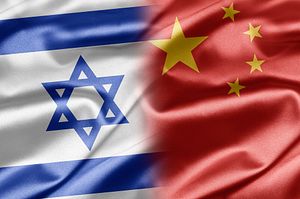Israeli President Shimon Peres arrived in Beijing on Tuesday for a three-day state visit to China. Peres’ trip was the first visit to China by an Israeli president since 2003, although Prime Minister Benjamin Netanyahu took a trip to China in May 2013. Netanyahu’s visit itself was noteworthy, as it was the first such trip by an Israeli Prime Minister since 2007. Both Peres and Netanyahu’s trips to China point to a renewed interest in China-Israel ties.
Just before his trip, Peres said that given China’s rising world status, and its growing interest in the Middle East, strengthened China-Israel ties are in the best interests of both countries. In an op-ed for The Jerusalem Post, Chinese Ambassador to Israel Gao Yanping wrote that Peres’ visit to China “will promote a new high in China-Israel relations.” Indeed, China and Israel have been rapidly developing their ties of late, with a flurry of high profile visits since Netanyahu’s trip to Beijing last May.
Much of the focus has been on trade and economic cooperation. China is Israel’s third-largest trading partner, and bilateral trade between the two countries was worth over $10 billion in 2013. Officials from both countries hope to keep the positive momentum going. China is particularly interested in advancing technological cooperation with Israel. In a sign of China’s priorities, Ambassador Gao describes Israel in her op-ed as “a happy and innovative startup nation with many cutting-edge technologies.” According to Chinese reports, Beijing is especially interested in cooperation in the fields of agriculture, natural resources, environmental protection, education, and healthcare.
Israel is amenable to such cooperation—according to Defense News, China is second only to the U.S. in joint high-tech projects with Israel’s Chief Scientist Office, and has surpassed Europe as the second leading source of high-tech capital. There are also growing calls in Israel to restart the arms trade with China, although currently U.S. pressure has prevented this from happening.
For his part, in an interview with Chinese press, Peres made clear Israel’s admiration for China’s ability to raise millions out of poverty without relying on foreign aid. Peres said that “China can do a great service to the Middle East” by showing the region how to “save itself, with its own hand, their own countries, not by dollars and not by Rubles, but [by] really mobilizing the people to come together.” This sentiment hints at one possible motivating factor in Israel’s courting of China: a desire to balance against over-reliance on American aid and support.
Still, according to the Times of Israel, Israeli officials want to keep the focus of the visits on the more anodyne subjects of trade and economic relations. Meanwhile, China has been pushing for a larger diplomatic focus in its ties with Israel. As China’s energy interests in the region grow, China wants to play a bigger role in Middle East affairs, including the Holy Grail of Middle East diplomacy: Israel-Palestine negotiations (reportedly at America’s urging).
This ambition was on full display last year, when Xi met with Palestinian leader Mahmoud Abbas and Israel Prime Minister Netanyahu in quick succession, urging a revival of peace talks between the two. Foreign Minister Wang Yi also drove this point home after his January visit to the Middle East, when he expressed China’s interest in joining the Middle East Quartet. It’s no surprise, then, that in his meeting with Peres Xi Jinping brought up China’s hopes for quick progress in the Israel-Palestine peace talks. In fact, this was the major focus of Xinhua’s Chinese-language coverage of the meeting.
When it comes to China-Israel political ties, however, the question of Iran remains a major stumbling block. Israel considers a nuclear-armed Iran to be an existential threat. Netanyahu has even made it clear that he will not rule out the possibility of a preemptive strike against Iran to prevent it from gaining nuclear weapons. Meanwhile, China has been unwilling to push for harsher sanctions against Iran, especially given its lucrative oil deals with Tehran. China is the largest purchaser of Iranian oil, and last year was purchasing some 50 percent of Iran’s oil exports, causing some in the U.S. to grumble that China is undermining the sanctions regime against Iran. As expected, Iran was a topic of discussion in Peres’ meeting with Xi Jinping, where Xi said that he understood Israel’s concerns.
Currently, with the P5+1 involved in negotiations with Iran over a permanent solution to the nuclear problem, China hopes to be able to maintain ties with Iran while also improving relations with Israel. China is actively cultivating relations with both countries—Iranian President Hassan Rouhani is expected to travel to China in April or May. For its part, Israel may hope that by improving ties with China, it can convince Beijing to use its influence in Tehran to address Israel’s security concerns.

































